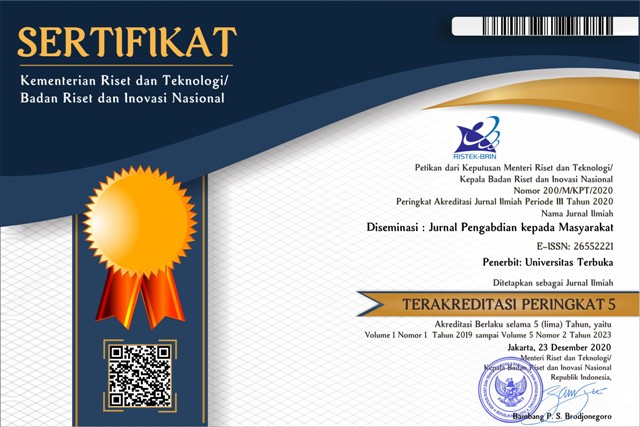MEMANFAATKAN LIMBAH PLASTIK MENJADI PAVING BLOCK
DOI:
https://doi.org/10.33830/diseminasiabdimas.v2i2.748Keywords:
plastic waste, paving block, pollution problemsAbstract
Plastic waste becomes one of the sources of environmental pollution problems. Landfill in the final landfill in Palembang, will be a serious problem if it is not sought solution. This community service is in the form of counseling and processing training of plastic waste into paving block given to the partners of the community in the location where the garbage disposal. The provision of counseling and training is expected to be the process of utilizing science and technology in the utilization of plastic waste so it is economically beneficial for the community because it has a high selling value. The implementation phase of this activity in the form of 1) establishment of partnership by determining the community, 2) fulfillment of production equipment, 3) counseling on the innovation of entrepreneurship and marketing of products, 4) training of paving block making. The result of this activity is that partners can make paving blocks from plastic waste and have entrepreneurial innovation and product marketing
References
Koranindonesia.id https://koranindonesia.id/60-sampah-plastik-jadi-tumpukan-abadi-di-tpa/ diakses 25/08/2019
Pengolahan Limbah Plastik Menjadi Produk Kreatif Sebagai Peningkatan Ekonomi Masyarakat Pesisir. https://www.Researchgate.Net/Publication/ 326044239_ Pengolahan_Limbah_Plastik_Menjadi_Produk_Kreatif Sebagai Peningkatan Ekonomi Masyarakat_Pesisir. Diakses 8 januari 2019.
Polusi Plastik. https://id.wikipedia.org/wiki/Polusi_. Diakses 8 Januari 2019.
Wahyono, E. H. dan Sudarno.N. 2012. Pengelolaan Sampah Plastik: Aneka Kerajinan dari Sampah Plastik. Bogor: Yapeka
Downloads
Published
Issue
Section
License
Copyright and Licensing

Diseminasi : Jurnal Pengabdian kepada Masyarakat is licensed under a Creative Commons Attribution-NonCommercial-NoDerivativeWorks 4.0 International License. Allows users to copy and distribute the Article, provided this is not done for commercial purposes and further does not permit distribution of the Article if it is changed or edited in any way, and provided the user gives appropriate credit (with a link to the formal publication through the relevant DOI), provides a link to the license, and that the licensor is not represented as endorsing the use made of the work.















